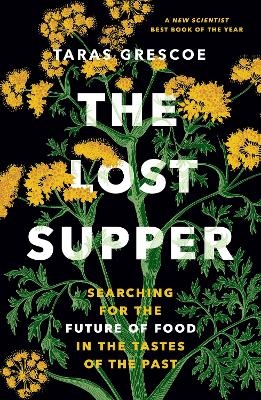
The Lost Supper
Searching for the Future of Food in the Tastes of the Past
Seiten
2024
Greystone Books,Canada (Verlag)
978-1-77840-212-8 (ISBN)
Greystone Books,Canada (Verlag)
978-1-77840-212-8 (ISBN)
For fans of Michael Pollan and Anthony Bourdain, this “surprising, flavorsome tour of ancient cuisines” (Kirkus STARRED)—from Neolithic bread to ancient Roman fish sauce—reveals why reviving the foods of the past is the key to saving the future.
“A fascinating look at the people who are keeping these ancient food traditions alive against the odds, while offering a rough roadmap toward a more sustainable food ecosystem.”—Eater
Many of us are worried (or at least we should be) about the impacts of globalization, pollution, and biotechnology on our diets. Whether it's monoculture crops, hormone-fed beef, or high-fructose corn syrup, industrially-produced foods have troubling consequences for us and the planet. But as culinary diversity diminishes, many people are looking to a surprising place to safeguard the future: into the past.
The Lost Supper explores an idea that is quickly spreading among restaurateurs, food producers, scientists, and gastronomes around the world: that the key to healthy and sustainable eating lies not in looking forward, but in looking back to the foods that have sustained us through our half-million-year existence as a species.
Acclaimed author Taras Grescoe introduces readers to the surprising and forgotten flavors whose revival is captivating food-lovers around the world: ancient sourdough bread last baked by Egyptian pharaohs; raw-milk farmhouse cheese from critically endangered British dairy cattle; ham from Spanish pata negra pigs that have been foraging on acorns on a secluded island since before the United States was a nation; and olive oil from wild olive trees uniquely capable of resisting quickly evolving pests and modern pathogens.
From Ancient Roman fish sauce to Aztec caviar to the long-thought-extinct silphium, The Lost Supper is a deep dive into the latest frontier of global gastronomy—the archaeology of taste. Through vivid writing, history, and first-hand culinary experience, Grescoe sets out a provocative case: in order to save these foods, he argues, we've got to eat them.
Published in partnership with the David Suzuki Institute.
“A fascinating look at the people who are keeping these ancient food traditions alive against the odds, while offering a rough roadmap toward a more sustainable food ecosystem.”—Eater
Many of us are worried (or at least we should be) about the impacts of globalization, pollution, and biotechnology on our diets. Whether it's monoculture crops, hormone-fed beef, or high-fructose corn syrup, industrially-produced foods have troubling consequences for us and the planet. But as culinary diversity diminishes, many people are looking to a surprising place to safeguard the future: into the past.
The Lost Supper explores an idea that is quickly spreading among restaurateurs, food producers, scientists, and gastronomes around the world: that the key to healthy and sustainable eating lies not in looking forward, but in looking back to the foods that have sustained us through our half-million-year existence as a species.
Acclaimed author Taras Grescoe introduces readers to the surprising and forgotten flavors whose revival is captivating food-lovers around the world: ancient sourdough bread last baked by Egyptian pharaohs; raw-milk farmhouse cheese from critically endangered British dairy cattle; ham from Spanish pata negra pigs that have been foraging on acorns on a secluded island since before the United States was a nation; and olive oil from wild olive trees uniquely capable of resisting quickly evolving pests and modern pathogens.
From Ancient Roman fish sauce to Aztec caviar to the long-thought-extinct silphium, The Lost Supper is a deep dive into the latest frontier of global gastronomy—the archaeology of taste. Through vivid writing, history, and first-hand culinary experience, Grescoe sets out a provocative case: in order to save these foods, he argues, we've got to eat them.
Published in partnership with the David Suzuki Institute.
Taras Grescoe is the author of seven nonfiction books and a widely read commentator on the interplay of food, travel, and the environment. His journalism has been published in many of the world's leading newspapers and magazines, including the New York Times, the Guardian, and National Geographic. He lives in Montreal, Quebec.
Prologue
1 MONTREAL
Kitchen Dreams
2 MEXICO CITY
The Secret of Axayacatl
3 OSSABAW ISLAND
Some Pig
4 CÁDIZ
The Quintessence of Putrescence
5 YORKSHIRE DALES
Hard Cheese
6 PUGLIA
The Death of the Immortals
7 CAPPADOCIA
Lost and Found
8 SAINT-JEAN-SUR-RICHELIEU
Bread Alone
9 MI'WER'LA
The Cooked and the Raw
Epilogue
Acknowledgments
Selected Bibliography
Index
| Erscheinungsdatum | 23.07.2024 |
|---|---|
| Zusatzinfo | B&W photo insert |
| Sprache | englisch |
| Maße | 127 x 197 mm |
| Themenwelt | Sachbuch/Ratgeber ► Essen / Trinken |
| Sachbuch/Ratgeber ► Gesundheit / Leben / Psychologie ► Ernährung / Diät / Fasten | |
| Geschichte ► Allgemeine Geschichte ► Vor- und Frühgeschichte | |
| Sozialwissenschaften ► Soziologie ► Makrosoziologie | |
| ISBN-10 | 1-77840-212-7 / 1778402127 |
| ISBN-13 | 978-1-77840-212-8 / 9781778402128 |
| Zustand | Neuware |
| Informationen gemäß Produktsicherheitsverordnung (GPSR) | |
| Haben Sie eine Frage zum Produkt? |
Mehr entdecken
aus dem Bereich
aus dem Bereich
Was Pompeji über uns erzählt
Buch | Hardcover (2023)
Propyläen (Verlag)
CHF 44,75
auf den Spuren der frühen Zivilisationen
Buch | Hardcover (2023)
C.H.Beck (Verlag)
CHF 27,95


